88. Xをしたい vs Xがしたい
The Indestructible Core of Japanese. How the logic never fails. Xをしたい vs Xがしたい | Lesson 88
こんにちは。
Today we're going to talk about the core fundamental structure of Japanese and a problem that troubles some people about it, which I've tried to lay to rest[43] but there's still some difficulty, I think, so I'm going to try to tackle the question, for what I hope will be the last time, today. And in doing that we're going to look at a puzzle that's posed by the title of a very popular work.

It's been a manga, an anime, a live-action movie: 君の膵臓を食べたい, which means literally I want to eat your pancreas, and we'll talk about why it literally means that in a minute. I didn't actually know what a pancreas was. I thought it was a railway station in London. But apparently it's a component that you find inside the human body and things don't go so well without it. I'm not very clear on what you find when you take off the front and back panels of a human body, so we learn something new every day! That's why this is classified as an educational channel, I suppose.
So, the question that will be raised by this title in the minds of anybody who's got some grasp of the real structure of Japanese, is:
Why is the particle を used instead of the particle が here?
Why is the particle を, rather than the particle が, used here?
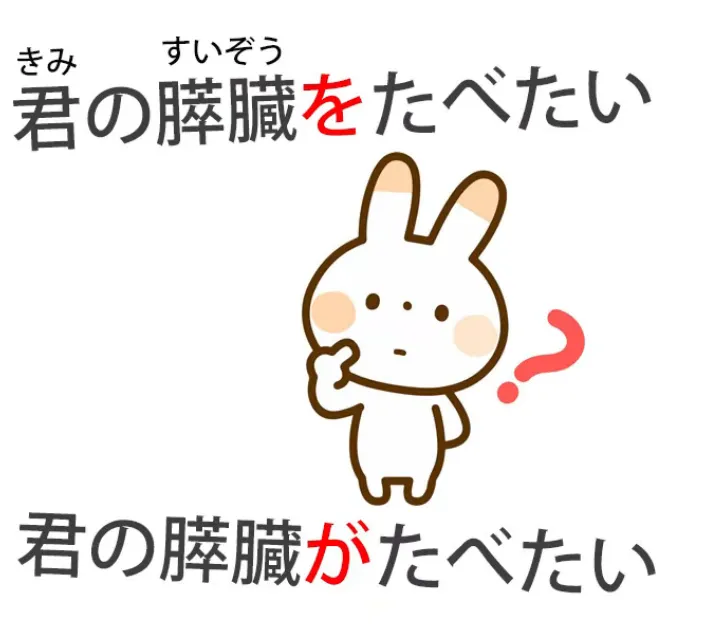
If we want to say what in English would beI want to eat that bread or I want to eat that cake, we would sayパンが食べたい, ケーキが食べたい.
And, as we see, the adjective たい,
the adjective of desire たい, is pointing not at me but at the cake.
The cake carries the が-particle, so that is what the adjective is describing.
And confusion ensues[9] when we actually translate this as literally meaning **I want to eat cake, because that's not what it means.**
It means cake is want-inducing (to me). (私は) ケーキが食べたい。
But we also know that this adjective of subjectivity, like other adjectives of subjectivity,
like 怖い (frightening), and also potentials like できる or 食べられる --
because potential is also a kind of subjectivity.
It's something peculiar to the individual, whether they can or can't do a particular thing.
It's not inherent in the thing itself.
That would be 可能性.
We know that all of these generally point at the thing that's possible, the thing that
induces the desire to eat, the thing that's scary, etc.
But also the polarity can be flipped.
And it's flipped particularly when there isn't an actual cause, an actual visible or
tangible cause of the subjectivity.
The polarity flipping
So if we say, お腹が空いた、 (zeroが) 早く食べたい, - there seem to be 2 clauses, I guess?
we're saying Tummy is empty, I want to eat soon.
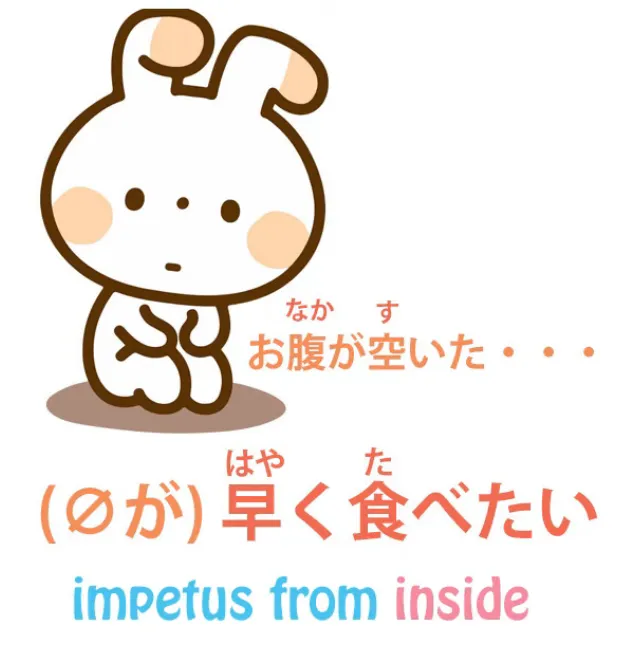
Now that たい is pointing at me, not at any particular thing, like cake or anything else.
Now, this is the point that a few people have actually resisted and said,
"Well, can't we say that it's not really saying 'I want to eat',
it's saying 'food in general is making me want to eat'?"
Well, it isn't actually.
It's your empty tummy that's making you want to eat.
And we're going to look at some constructions today, and the one we've just talked about is one of them, that make it a 100% clear that not only in cases where there isn't acause of the subjectivity, but in some cases where there is, the adjective of subjectivity can still flip its polarity.
Now, why do people resist this idea?
As a matter of fact, it's not unknown even in English.
We can say We were happy that day, in which case the adjective happy is pointing at us (we're the ones that were happy) or we can say
That was a happy day, and now the adjective of subjectivity is pointing at the day, which is the cause of our happiness.

We can say I am suspicious of her behavior and the adjective suspicious is pointing at me (I'm the one who's suspicious)
or her behavior is suspicious, and now the adjective suspicious is pointing at her behavior as the cause of my subjectivity.
So this isn't something that doesn't happen, even in English.
For the reason, I think, that people become so agitated about this and so determined to find quite unlikely ways of wriggling out of it is perfectly understandable.
It's because they may have spent months or even years in this terribly confusing world where particles just change their meaning depending on which side of bed they got out of that morning.
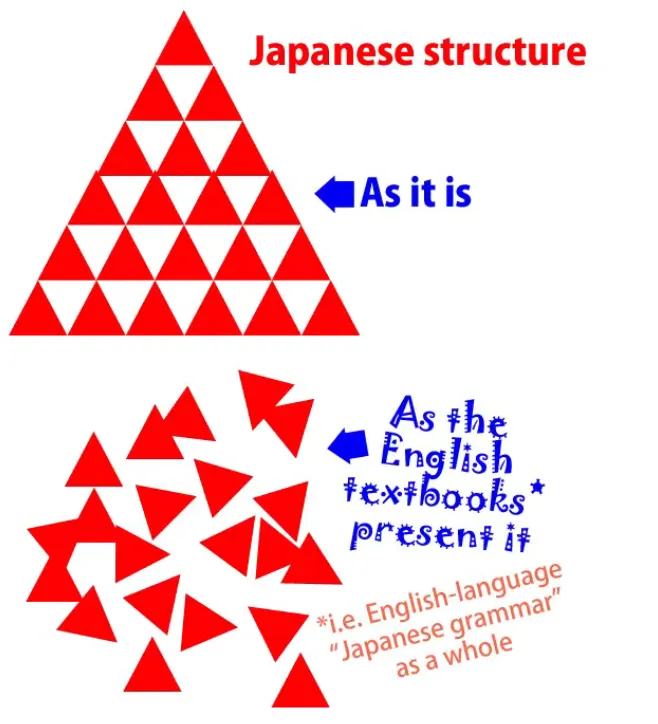
INFO
(Dolly here 👇 is making an example of the confusing trying to force English into Japanese)
So, "が usually marks the subject of a sentence but it can also mark the object of a sentence as in パンが食べたい, in which obviously the bread isn't the subject of the sentence; it's me, 'I want to eat bread'."
Well, we know that this isn't the case.
We know that in those cases it's the bread that's the subject; it's the bread that's making me want to eat.
And if we start saying
"That the polarity can flip, doesn't that either break the model of Japanese structure
that gets rid of all these ambiguities or introduce new ambiguities
so, ooh there are special rules that sometimes it points this way and sometimes it points that way", well, the answer to that is no, it doesn't matter to the model.
It's quite irrelevant to the model.
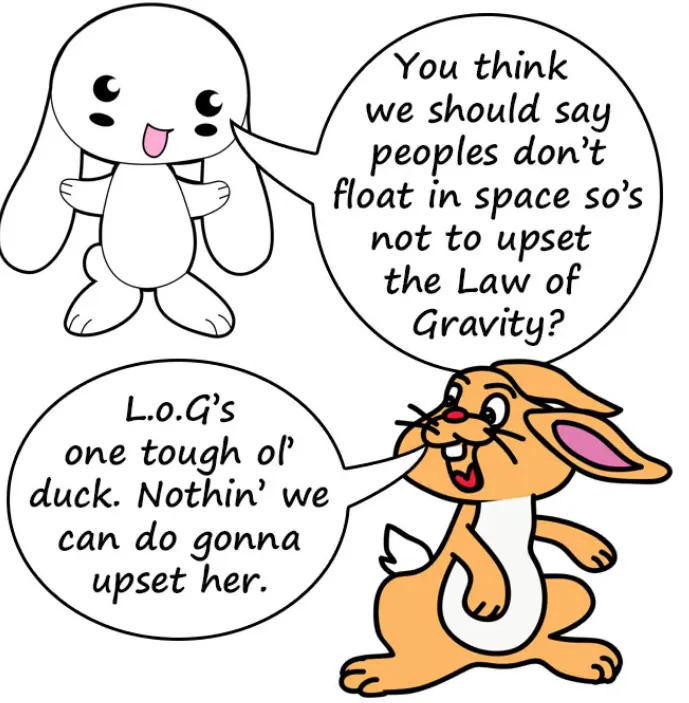
Whether we choose to say パンが食べたい (bread is making me want to eat) or
パンを食べたい (I want to eat bread) doesn't matter.
The only thing that matters to the model is that the particles are always doing the same thing.
If we say パンが食べたい, we're saying The bread (=Subject) is making me want to eat.
vs
If we say (zeroが) パンを食べたい, we're saying that (I) want to eat bread (=Direct Object).
INFO
Here, zeroが is the implied/hidden I Subject, while パンを is the Direct Object = bread.
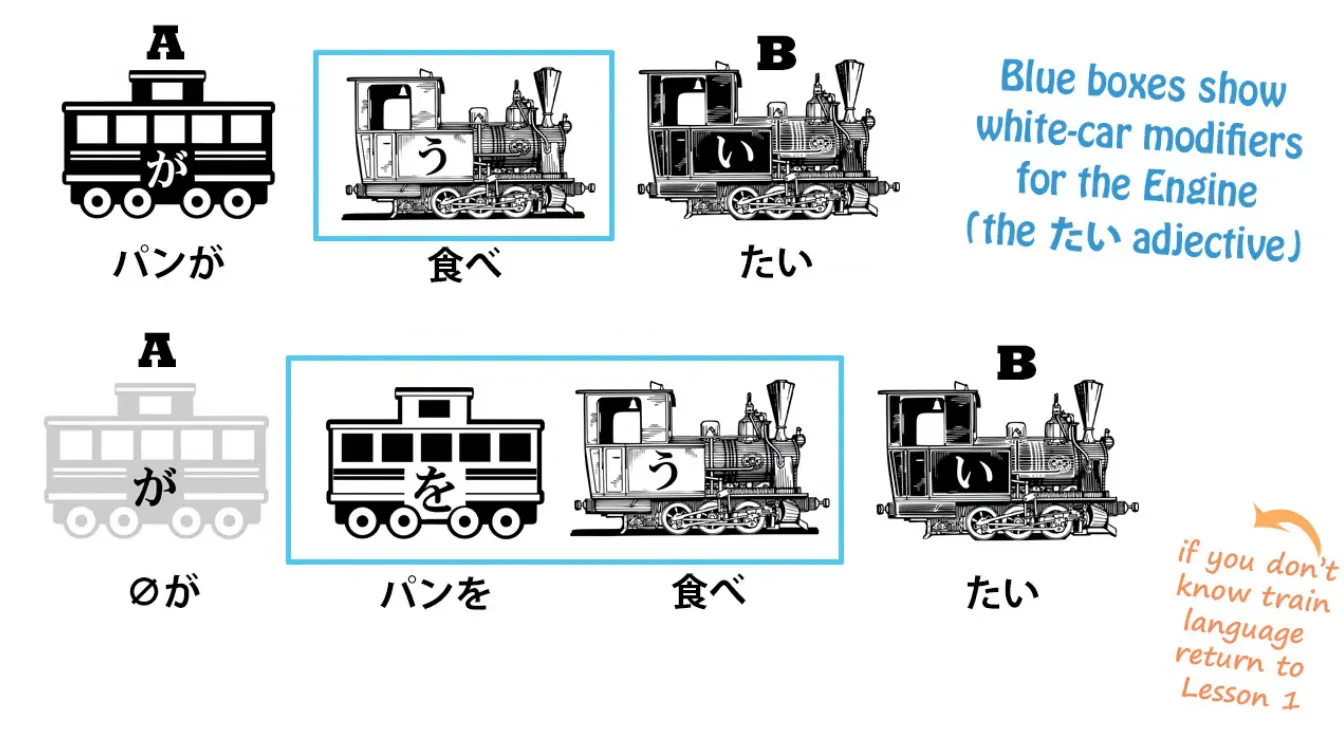
And the model doesn't care which way we say it.
The model is doing the same thing either way.
All the particles are doing exactly the same thing.
How to justify the model grammatically?
Now, can we justify this grammatically?
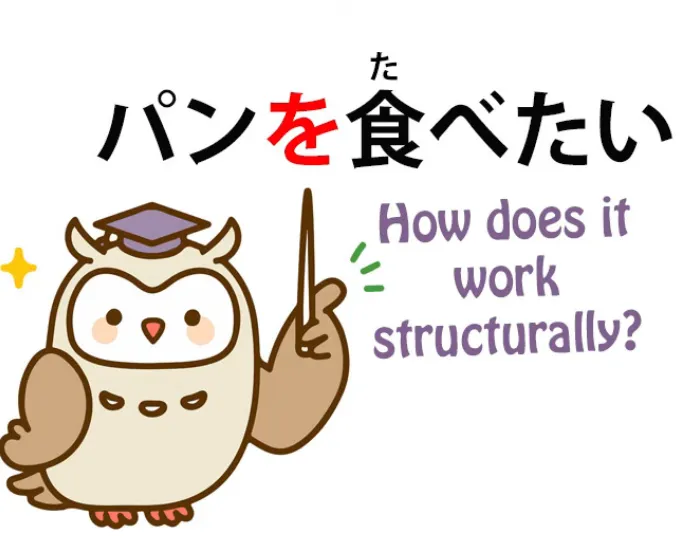
So if we say, for example, パンを食べたい, surely the problem here is that
with たい we have an adjective, so we have an adjectival sentence,
and an adjective, as we know, can't take a direct object.
So how can we say パンを食べたい?
And the answer to this is really very simple.
Japanese, as we know, is very adept at gluing verbal elements together to make them into one element or taking them apart at will.

And what's going on in a sentence like パンを食べたい is thatたい is no longer being attached simply to the verb 食べる.
We're not saying パンを and then 食べたい,
we're saying パンを食べ... and たい is being attached to that entire unit.
What we want is the action パンを食べる, so we can attach the たい to that entire unit.
That's what makes sense of these constructions.
And while パンを食べたい is a less common way of putting it, and in general
何々を食べたい is the less common way of putting it,
there are some kinds of sentence in which it is the one that we always use.
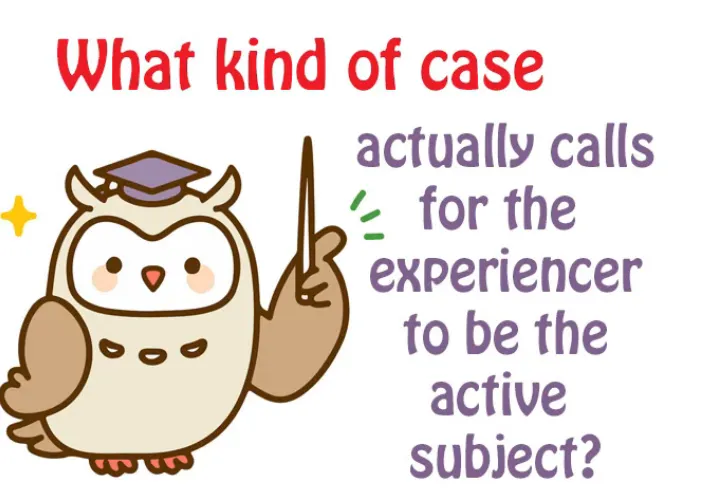
For example, 助けたい (want to help) or 守りたい (want to defend).
We don't say さくらが守りたい,
we say さくらを守りたい.
And if we're talking about 正義 (justice) or 平和 (peace) or even 国 (country), it's the same.

We don't say Sakura is making me want to defend her, we don't say the country is making me want to defend it, we don't say justice is making me want to defend it, or peace is making me want to defend it.
We always say I want to defend Sakura, I want to defend justice, I want to defend peace, I want to defend the country.
(all as Direct Objects instead of Subjects as shown above since they are used with を particle)
Why is that?
Well, essentially I think the reason is that we are not talking about an impulse desire.
If we look at bread and we want to eat it, Ah, パンが食べたい
(bread's making me want to eat it).
But we're talking here about things that are more abstract, things that are less impulsive.
And in the case of people, it's more respectful to say
さくらを守りたい than さくらが守りたい,
because we're not saying that Sakura is an object (implication-wise, grammar-wise she is:D)
that makes me want to defend her, like a piece of bread that we might want to eat,
we're saying that the action of defending her is something I want to do,
which is more dignified in the case of a person.
But in the case of, say, the country, or peace, or justice, or even a house or a park,
we're talking about something less impulsive and more a decision of our own,
if not a conscious decision, then a mindset, a way of thinking that is ours.
So we talk about that action as our own rather than something induced by the external cause.
If we do say パンを食べたい,
this is likely to be in conditions where we're talking a little bit more generally,
we're not talking about that particular lovely smell of bread by which
the bread is making us want to eat it.
We're not talking about some candy we've just seen that's making us want to eat it.
We're talking about the general desire to eat bread.
So we're more likely to say パンを食べたい時 (when I want to eat bread*=Direct Object*)
INFO
In the sentence above, I should be the Subject, which is hidden in Japanese as zeroが.
than パンが食べたい時 (when bread*=Subject* makes me want to eat it).
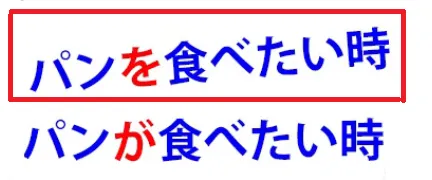
And this isn't a firm and definite rule but this is the kind of tendency,
the kind of reason, the nuance, which decides which way
we're likely to flip that adjective of desire, in this case, たい.
So why is を used in 君の膵臓を食べたい?
So if we come back to 君の膵臓を食べたい, why is を being used here?

Well, essentially because again this is not an impulse to eat.
We're not looking at the girl's pancreas and thinking how delicious it is.
That would be rather hard to do anyway.
Something subtler, something more abstract, something deeper, is being talked about here, the desire for some emotional and quite complex reason to eat somebody's pancreas.
So I hope this time we really laid to rest the final question of polarity switching (of Lesson 43).
It does not threaten the model. And it does happen.
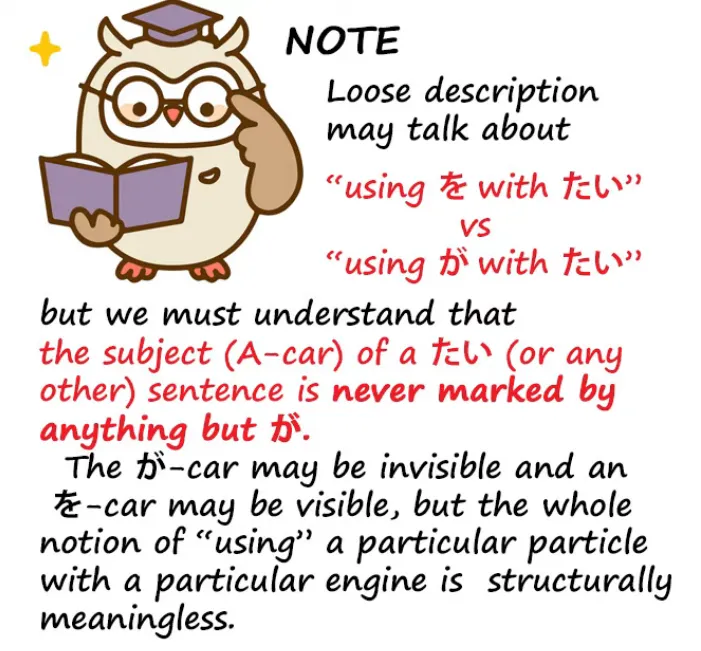
And it happens for reasons which are a little subtle, that will probably take time to ingest
and immersion to ingest, because you can't learn everything through raw structure.
INFO
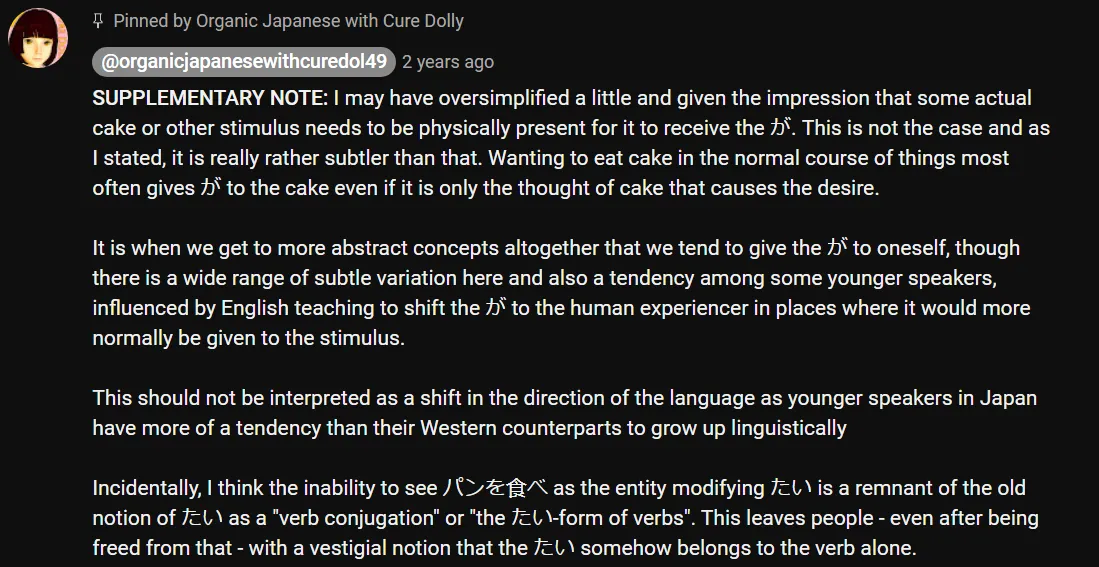

Read THIS COMMENT TREE where Dolly gives some useful info about が use.
It also slightly touches over the cases where there are 2 visible logical particles like が or を in a single clause, since it can happen at times such as with a compound Adjective like 頭がいい. Also, this one can be useful if the たい stuff used with を is a bit confusing, same for ない.
Hopefully it can be read/understood well enough & is not too bloated, but there was so much important stuff mentioned here that I had no other choice, really, to the point I even had to resort to bolding at times to make it clearer. Definitely recommend reading through the comments.